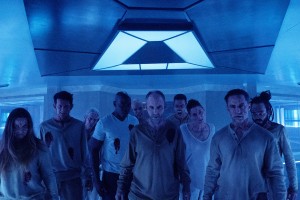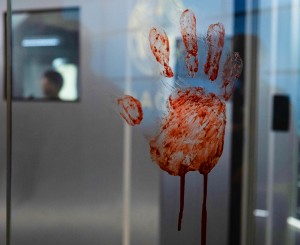In the two-hour first-season finale of THE PASSAGE on Fox, Monday, March 11, things change a lot for the characters, and for the whole world. Nobody is willing to say exactly what those changes are – nobody wants to give spoilers – but everybody agrees something monumental happens. In the television adaptation of Justin Cronin’s trilogy of novels, we know that government experiment Project Noah has gone terribly wrong, resulting in people becoming vampire-like Virals. Young Amy Bellafonte (Saniyya Sidney) has been exposed to the virus, but she is different from the other Virals. Former special agent Brad Wolgast (Mark-Paul Gosselaar) has dedicated himself to protecting Amy from both the Virals and government forces, though Amy sometimes needs to protect Wolgast.
Jason Ensler is the directing executive producer of THE PASSAGE, meaning that he both directs episodes and supervises the other episodic directors. Ensler was also an exec producer/director on FRANKLIN & BASH, where he worked with THE PASSAGE lead Mark-Paul Gosselaar, CULT, HEART OF DIXIE, THE RED BAND SOCIETY and THE EXORCIST.
In a phone conversation, Ensler discusses his work on THE PASSAGE, along with what little he can divulge about the season finale.
ASSIGNMENT X: Since Mark-Paul Gosselaar is in THE PASSAGE, and you were both on FRANKLIN & BASH, did one of you have something to do with bringing the other one in?
JASON ENSLER: I believe that Mark-Paul was instrumental when my name came up, of getting me in the room, which I am grateful for.
AX: Had the two of you worked together between FRANKLIN & BASH and THE PASSAGE?
ENSLER: No, we hadn’t. We stayed in touch, and we’d been looking to work together, but this is the first opportunity.
AX: Gosselaar’s character in THE PASSAGE, Brad Wolgast, is significantly darker than his FRANKLIN & BASH character …
ENSLER: I think it was largely in the writing. There’s a point in all of our lives where a boy becomes a man, and he still had a little youthful adorableness in FRANKLIN & BASH, and there was a little bit of lightness to him. And since then, I think PITCH was very influential, he’s really grown into just a man. And so I think to embrace that darkness I think was something he was looking forward to doing, and he just seems like a guy who’s lived a life now.
AX: When you were directing on THE EXORCIST, you also worked with Brianne Howey, who plays the Viral Shauna Babcock in THE PASSAGE. Did you bring her onto THE PASSAGE, or is your reunion on this show a coincidence?
ENSLER: That was a coincidence. In fact, when I did the second season of THE EXORCIST, we brought Hannah Kasulka back from the first season, and then we sent a picture to Brianne, and then she sent us a picture from THE PASSAGE, so we were all in touch, and then when I got on set, it was all just serendipitous, and great to work with her.
AX: How many episodes of THE PASSAGE have you directed for this season?
ENSLER: I did the pilot, plus three. So I did the pilot, the second, third, and the ninth. The ninth was fairly complicated. Without giving anything away – I guess that’s all I can say [laughs].
AX: THE PASSAGE episodes look like they’re fairly complex to shoot. Do you get any additional time to prep?
ENSLER: [laughs] No, I wish. We had a little more time on the second episode, because we had to build all of the standing sets, which were the [government Project Noah] Level 4B hallway, lab, research center, conference room, cell block, and then the Level 3A converted hotel, where Amy and Carter [a Viral played by McKinley Belcher III] are housed. So we had a little extra time to build those sets, and we had a little more time with the script. But after that, no, we had seven/eight days of prep on each episode. There’s a major change in [Episode] 9, and it required a lot of special effects rigging, a lot of stunts, a lot of visual effects, a lot of stunt work, a lot of fight work. So there wasn’t enough time to pull it off, or prep it, but somehow, we finished it.
AX: What have you had the opportunity to do on THE PASSAGE that you hadn’t on previous jobs?
ENSLER: There is a lot more epic scope to the story, and the challenge was to create this epic, sweeping tale about the end of humanity, and then really reduce it to these two-person character scenes. So I hadn’t really had the chance to have both that scope and that intimacy at the same time. And that was really exciting to do, and it actually grounded the scope, and really allowed us to tell a much more in-depth character story.
AX: Was having done THE EXORCIST helpful to you in working on THE PASSAGE, in terms of working with special effects, and characters who do things that people don’t normally do?
ENSLER: Yes. Well, certainly the design of the Virals was very influenced by the naturalistic design of the demons in THE EXORCIST. In fact, Tracey Anderson and her team were the special effects makeup artists on both THE EXORCIST and THE PASSAGE. Also, THE EXORCIST was a great genre piece to figure out where the scares belonged, and how to pull off a scare. And though this is a more broad palette, it’s not straight horror, it’s more of a thriller, and an adventure, it was good to know how to pull off the scares, and where.
AX: Although the characters make a point of not calling the Virals “vampires,” does it work the same way as vampires if a Viral bites someone?
ENSLER: The Virals bite in two ways. They bite in one way to kill, and in another way to turn you, to make more of themselves.
AX: And are Virals immortal in the same way that vampires are immortal?
ENSLER: No, they are for all intents and purposes, immune to disease, so they are immortal. The same thing with anyone who has been turned. If nobody puts a bullet in their sweet spot, which is the thymus gland, then they should live.
AX: So unlike zombies, you have to shoot them near the heart, not in the brain.
ENSLER: Correct.
AX: Are you going for just jump scares, or are you going for more gut-churning, “Oh, no, what happens next” suspense?
ENSLER: Yeah. I think it’s less jump scares. In fact, I can’t think of too many jump scares in the show. There are a few moments where people are waking up from those dreamscapes that might be a little jumpy, but otherwise, they’re more slow-burn psychological scares, and more scares of not having your footing. It’s more about disorientation, not knowing exactly where you are, falling down a rabbit hole, much more in the subjective mind-twisting of it all.
AX: Wolgast seems like he’s got his moral compass fairly screwed on straight, and so does Amy. With the characters who are a little more morally ambivalent, like Henry Ian Cusick’s Jonas and Caroline Chikezie’s Major Sykes, do you have fun sort of exploring the parameters of their ambivalence?
ENSLER: Oh, for sure. And I would say that even Wolgast is conflicted, because he’s a man who has a sense of duty and responsibility to his job as a soldier, and then he goes rogue and makes this choice [to go against orders and help Amy]. The conflict between him and Richards [Wolgast’s erstwhile partner, played by Vincent Piazza] is really the conflict of two moral rights, much like Richard Kimble and Girard in THE FUGITIVE, or Jean Valjean and Javert [in LES MISERABLES], where everyone is just doing what they think is the best thing for the circumstance, and each choice that the characters are faced with are not good choices, you’re just making the best choice in the lesser of two evils.
AX: Is it fun dealing with Jamie McShane’s character Tim Fanning, the leader of the Virals, because he’s mostly having such a good time with his powers?
ENSLER: He is. He is a little bit delicious in his power, in his understanding of the potential of his power, if only he were free. But as you see in the series, and in flashbacks, he was a very conflicted man, who often made wrong choices in the interest of gaining power, even as a human. So it’s great to carry that into his monstrous self, and see that he was ripe to be given this opportunity to be an immortal monster.
AX: How is it working with Saniyya Sidney, because she is a good deal younger than the rest of your cast?
ENSLER: First of all, she’s delightful and she’s a total pro. And when she shows up to set, she’s really willing to surprise herself. And in the process of surprising herself, she surprises us. And she’s always making new choices, exciting choices, and she’s kind of an old soul. And when she’s on set, we never feel like there’s a kid on set, we feel like she’s part of the cast, and she’s oftentimes guiding us in the right direction tonally of where the show should be.
AX: So she gives her scenes their grounding, and some things come out of how she’s approaching it?
ENSLER: Yeah, and especially since [her character Amy is] a hero and we see the world through her point of view, we work together to set the tone for the scene, and find the nuance and the direction of the scene. And our whole cast is great, and they’re each inspiring the others to be more present, to be more authentic, to be better, and she’s certainly a part of that.
AX: Apparently, there’s a big change coming in Episode 9. Did you have to change your approach to the show at all for that?
ENSLER: Well, Saniyya was ten when the pilot was shot, and then eleven when it was reshot, and now she’s twelve, so we’ve got a growing human person [laughs] who needs to be the same age through the course of the story in the first season. So we made our geometrical adjustments to create the illusion that sometimes she’s smaller than she is. As far as the change that happens in the story, I can’t really speak to that, because I don’t want to give anything away. But once she’s injected with the virus, we lean into a touch of growth, just to accommodate real life.
AX: Why was THE PASSAGE pilot reshot?
ENSLER: I think that when you’re dealing with the adaptation of three books that are over six/seven hundred pages each, that span nine hundred years, the original conception I think made the jump in time, and cut back and forth between a world a hundred years from now and the present. I came in later, but it was my understanding that that was too much to fit into the pilot. So it was reconceived so that the first season would be the genesis of vampire apocalypse, the origin story of the vampire apocalypse, and the ethical dilemmas that took place at Project Noah that led to the end of the world. So it was reconceived to be smaller in the scope of the storytelling, but still lead up to a large jump in time.

McKinley Belcher III, Brianne Howey, Jamie McShane, Saniyya Sidney, Mark-Paul Gosselaar, Caroline Chikezie, Vincent Piazza, Emmanuelle Chriqui and Henry Ian Cusick in THE PASSAGE – Season 1| ©2019 Fox/Michael Lavine
AX: What’s been your favorite part of working on THE PASSAGE?
ENSLER: Well, obviously, digging into some of these genre tropes, and having it so that the decisions we make visually make a big difference in the storytelling is always fun. Working with [series creator/show runner] Liz Heldens and the writers has been really exciting and fluid, and a great collaboration, and we’ve had a really tremendous cast. Everybody’s super-cool and wants to do their best work. So we all come to work ready to play, and ready to make it better.
AX: In your capacity as directing producer, have you made any suggestions to Liz Heldens and the writers’ room?
ENSLER: Sometimes. They break the story, and then I’ll weigh in on certain structural things, and I might suggest various changes in locations, or maybe delaying a plot point ‘til the next episode, or little adjustments like that that can just sort of calibrate the season, because I’ve got to keep my eye on the whole thing, just like Liz does.
AX: Who else has input into those things besides you and Liz Heldens?
ENSLER: Me and Liz and Peter Elkoff, who’s an EP, and the other writers, and then the other producers at Scott Free, and Sixth and Idaho, so David Zucker and Adam Kassan and Clayton Krueger. So we’re all of a team and one sort of group think on how to tell the story to make the best [show].
AX: When you decide to delay a plot point, is that because you want to make sure you don’t run out of road, or is that because you want to give more time to the things that are happening in that episode?
ENSLER: Well, it’s a little bit of both, and it’s also the challenge in this kind of storytelling is to always question when you’re doing a large reveal, because there are a lot of reveals coming in almost every episode. And so sometimes it’s just a question of, are we doing too many reveals? Should we delay one of these until the beginning of the next episode? Where do we put the chess pieces so that the moves are fluid?
AX: With the death row prisoners who are experimented on and become Virals, was there any discussion of what sort of crimes they should have committed to make them more sympathetic, less sympathetic … ?
ENSLER: Yes. There are certain characters in the book – Babcock changed quite significantly from a man who committed very horrific crimes, to a woman whose crimes are motivated from a real place of trauma and pain. And so there’s been great effort by Liz and the writers to sort of live in the gray areas with characters who could otherwise be two-dimensional, and really see them for who they are, and see why they made the bad choices they made.
AX: And is there anything else you would like to say about THE PASSAGE right now?
ENSLER: I’ll just give a shout-out to our d.p.s, Byron Shah and Jan Richter-Friis, who did a really exceptional job at creating something that’s theatrical and thrilling, and at the same time, grounded and naturalistic when it needs to be, and Diane Lederman, who is our production designer – all of the 4B sets, which I feel are very elegant and just have a great look to them, without being too futuristic, feels like a well-funded government experiment underground in the mountains of Colorado. It’s been a pleasure and a blessing to work on it, and I’m really excited about the storytelling.
Related: THE PASSAGE: Henry Ian Cusick and Jamie McShane on the new Fox series – Exclusive Interview
Related: THE PASSAGE: Mark-Paul Gosselaar on new Fox virus series – Exclusive Interview
Related: THE PASSAGE: Brianne Howey on new Fox series – Exclusive Interview
Related: THE PASSAGE: Saniyya Sidney chats about new Fox genre series – Exclusive Interview
Follow us on Twitter at ASSIGNMENT X
Like us on Facebook at ASSIGNMENT X
Article Source: Assignment X
Article: THE PASSAGE: Director and executive producer Jason Ensler chats about the Season Finale
Related Posts:













